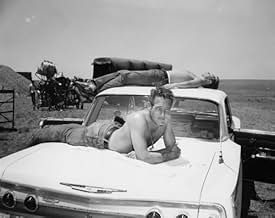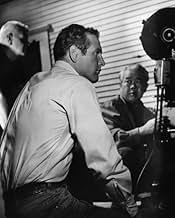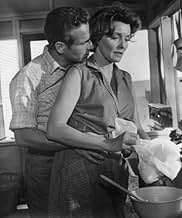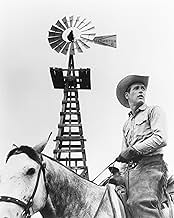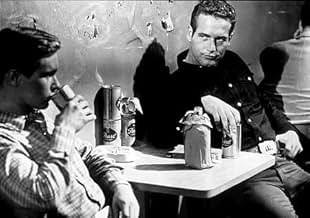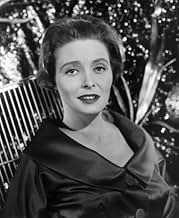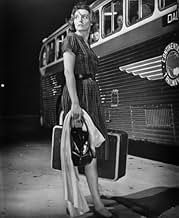VALUTAZIONE IMDb
7,8/10
25.151
LA TUA VALUTAZIONE
Paul Newman interpreta Hud Bannon, il figlio ribelle del rispettabile proprietario di un ranch, in continuo conflitto con l'anziano padre.Paul Newman interpreta Hud Bannon, il figlio ribelle del rispettabile proprietario di un ranch, in continuo conflitto con l'anziano padre.Paul Newman interpreta Hud Bannon, il figlio ribelle del rispettabile proprietario di un ranch, in continuo conflitto con l'anziano padre.
- Regia
- Sceneggiatura
- Star
- Vincitore di 3 Oscar
- 17 vittorie e 17 candidature totali
Brandon De Wilde
- Lonnie Bannon
- (as Brandon de Wilde)
Sharyn Hillyer
- Myra
- (as Sharon Hillyer)
Warren Anderson
- Proprietor Sweeping Glass
- (non citato nei titoli originali)
Recensioni in evidenza
It's difficult to grasp that Melvyn Douglas spent most of his career sailing through light, romantic roles and emerged in old age as one of the greatest actors in cinema history. Knowing the talent he possessed, how did he keep from killing the heads of the studios? Paul Newman, Melvyn Douglas, Patricia Neal, and Brandon de Wilde star in "Hud," an unsparing 1963 morality story about a Texas rancher, Homer Bannon, his bastard son, Hud, his housekeeper, and his grandson. The bastard, of course, is Paul Newman, who doesn't have a decent bone in his body. People on this board have said it's his greatest performance. He's given so many great ones, it's hard to say for me. An astounding actor, and he gets a run for his money from Douglas, who plays the moral center of the story.
The two characters couldn't be more opposite, as one sees in their treatment of a potential run of hoof and mouth disease that could wipe out Homer's entire herd. Hud wants to ship the whole herd out and possibly infect other people's cattle - he couldn't care less. Homer won't hear of it.
If you love animals, this is a difficult film to watch, but it's worth it. Melvyn Douglas is absolutely gut-wrenching as Homer, a proud man who loves the land and his cattle and who has no use for his son, who smashed his car and killed Homer's other son. de Wilde is Hud's nephew who admires him and wants to emulate him but as time goes by, realizes that Hud is made of ice. de Wilde doesn't give an emotional performance - he's almost more of an observer. It works well here amidst the very contained Douglas and the free and easy Newman. You can see he's a good kid trying to grow up and decide what kind of man to be.
Patricia Neal is the housekeeper; she and Douglas both deservingly won Oscars. Her delivery is wry and knowing; she can't help being attracted to the virile Hud but she knows he's trouble and never gives in to her desires willingly.
As much as I love Newman and think he's one of the greatest actors ever to hit the movies, for me, Douglas' searing performance is the one that will stay with me. It's easy to see why in 1963 this was such a dramatic breakthrough for Newman, but 43 years and many roles later, we're more familiar with what he can do. We know he can play a cold bastard now. His greatest performances for me will always be those in the "The Verdict" and "The Hustler," both of which called for many more nuances of character. Hud represents '60s disillusionment - which as the decade went on was only going to get worse; this is one of the reasons it is an iconic role. For me, Newman had more surprises in store.
Brilliant performances, excellent direction, stark photography, Hud is a great American film, not easily forgotten once seen.
The two characters couldn't be more opposite, as one sees in their treatment of a potential run of hoof and mouth disease that could wipe out Homer's entire herd. Hud wants to ship the whole herd out and possibly infect other people's cattle - he couldn't care less. Homer won't hear of it.
If you love animals, this is a difficult film to watch, but it's worth it. Melvyn Douglas is absolutely gut-wrenching as Homer, a proud man who loves the land and his cattle and who has no use for his son, who smashed his car and killed Homer's other son. de Wilde is Hud's nephew who admires him and wants to emulate him but as time goes by, realizes that Hud is made of ice. de Wilde doesn't give an emotional performance - he's almost more of an observer. It works well here amidst the very contained Douglas and the free and easy Newman. You can see he's a good kid trying to grow up and decide what kind of man to be.
Patricia Neal is the housekeeper; she and Douglas both deservingly won Oscars. Her delivery is wry and knowing; she can't help being attracted to the virile Hud but she knows he's trouble and never gives in to her desires willingly.
As much as I love Newman and think he's one of the greatest actors ever to hit the movies, for me, Douglas' searing performance is the one that will stay with me. It's easy to see why in 1963 this was such a dramatic breakthrough for Newman, but 43 years and many roles later, we're more familiar with what he can do. We know he can play a cold bastard now. His greatest performances for me will always be those in the "The Verdict" and "The Hustler," both of which called for many more nuances of character. Hud represents '60s disillusionment - which as the decade went on was only going to get worse; this is one of the reasons it is an iconic role. For me, Newman had more surprises in store.
Brilliant performances, excellent direction, stark photography, Hud is a great American film, not easily forgotten once seen.
10zetes
One Hell of a movie, and very nearly perfect. Paul Newman, Melvyn Douglas, and Brandon De Wilde star as three generations of a ranching family. Douglas is the patriarch, stern and strong, but clearly moving ever closer to the end of his life. Paul Newman, who plays the title character, is his youngest and only surviving son. There is an obvious but unspoken conflict between the two of them. In the middle is Brandon De Wilde, actually the film's main character (although all the choice acting moments belong to Douglas and Newman, and the yet to be mentioned Patricia Neal). His father, Newman's brother, died when he was very young. Growing up in Douglas' shadow, he worships the man and tries to emulate his moral code. However, his wilder side sees the untamed Newman as a sort of folk hero, and the rare times when he gets to hang out with his uncle seem to him to be the best of his life. Patricia Neal plays their maid (brilliantly, I should immediately state), after whom both uncle and nephew lust. A different conflict arises from this. As Hud, Paul Newman has many chances to be a second James Dean, exploding with emotion. Those scenes are excellent, of course, but where Hud succeeds most is at the edges of the screen. It is an enormously subtle film. The filmmakers should especially be commended for their amazing use of musical score. There is a really beautiful score, but it is never used, not once, to steer the audience's emotions. A good 90% of the film has no music in the background. Hud is an American masterpiece. 10/10.
Not only a stark morality tale brimming with grit and substance, "Hud" is a vigorous character study replete with intelligent, Oscar-winning performances.
The vast, desolate "Lone Star" landscape has often inspired potent Hollywood screen-writing (witness "Giant," and "The Last Picture Show"). 1963's "Hud" is no exception. The story focuses around a bored, aimless, arrogant ne'er-do-well whose utter contempt for humanity threatens to denigrate and destroy all those exposed to it. Thrust in a dusty, dried-up, decaying Texas cattle town (awesomely photographed in black-and-white by Oscar-winning cinematographer James Wong Howe), the story bears down assertively on its straightforward themes of nihilistic youth and misguided hero worship.
Paul Newman was awarded an Oscar - but not for "Hud." He took home the award much later for his performance in 1987's "The Color of Money" but for me it was a restitutive pat on the back for his probing, higher-calibre work here in "Hud," among others. Newman gives an assured, excitingly reckless performance, the creme of the crop of earlier, jaunty perfs. All swagger and bluff, reeking with cocky sexuality, Hud Bannon is the personification of cool, callous cynicism at its most reprehensible...and alluring. The world is this cowboy stud's oyster. He takes what he wants, whenever he wants it - whether its coveting his father's land or coveting another man's wife, whether its peddling sick cattle on others or peddling his ethics on a susceptive boy - it's all at the core of a dangerously irresponsible life's dogma. A loser's warped vision of winning. It was a risky star performance for Newman as Hud has no redeeming qualities whatsoever, but the actor plays out his acting cards brilliantly and winds up with a royal flush.
Newman is bolstered by a choice cast. Dusky-voiced Patricia Neal, whose looks had begun to harden by this time, is fascinating as the forlorn, slovenly housekeeper Alma who has her careworn hands full just keeping the lustful, roving Hud in line. Hud (and the audience) is perked by her stifled but not yet snuffed out sensuality, as she wisely avoids the obvious come-ons tossed her way. Making relative peace with her lonely, desultory existence, Alma has overcome a difficult past and find a sense of being as the makeshift homemaker to an aging rancher/widower (Melvyn Douglas) while tending to his impressionable grandson (Brandon de Wilde), instilling in the boy some good old-fashioned sense and motherly attention when necessary. Neal is top-notch especially in her final scenes and quite deserved her Oscar.
Oscar-winning Douglas is superb as Hud's upstanding, uncompromising father, a cattle man in the twilight of his years. Chocked full of conventional wisdom and righteous indignation, the prideful old-timer may or may not have contributed to his son's acute moral letdown, having given up on him as a "bad seed" long ago. Their confrontational scenes are pocked with harsh accusations and bitter conflict - never to be resolved. De Wilde, in a coming-of-age extension of his memorable "Shane" role, again portrays the embodiment of idolizing youth as the teenage Lon. Drawn to the brawling, good-looking "outer package" of his older Uncle Hud, deWilde is touching as his character gradually wises up to the realization that this superficial "package" is damaged goods, while those nearest and dearest to him fall by the waste side.
A near-classic to be sure. The performances alone make this a not-to-be-missed item.
The vast, desolate "Lone Star" landscape has often inspired potent Hollywood screen-writing (witness "Giant," and "The Last Picture Show"). 1963's "Hud" is no exception. The story focuses around a bored, aimless, arrogant ne'er-do-well whose utter contempt for humanity threatens to denigrate and destroy all those exposed to it. Thrust in a dusty, dried-up, decaying Texas cattle town (awesomely photographed in black-and-white by Oscar-winning cinematographer James Wong Howe), the story bears down assertively on its straightforward themes of nihilistic youth and misguided hero worship.
Paul Newman was awarded an Oscar - but not for "Hud." He took home the award much later for his performance in 1987's "The Color of Money" but for me it was a restitutive pat on the back for his probing, higher-calibre work here in "Hud," among others. Newman gives an assured, excitingly reckless performance, the creme of the crop of earlier, jaunty perfs. All swagger and bluff, reeking with cocky sexuality, Hud Bannon is the personification of cool, callous cynicism at its most reprehensible...and alluring. The world is this cowboy stud's oyster. He takes what he wants, whenever he wants it - whether its coveting his father's land or coveting another man's wife, whether its peddling sick cattle on others or peddling his ethics on a susceptive boy - it's all at the core of a dangerously irresponsible life's dogma. A loser's warped vision of winning. It was a risky star performance for Newman as Hud has no redeeming qualities whatsoever, but the actor plays out his acting cards brilliantly and winds up with a royal flush.
Newman is bolstered by a choice cast. Dusky-voiced Patricia Neal, whose looks had begun to harden by this time, is fascinating as the forlorn, slovenly housekeeper Alma who has her careworn hands full just keeping the lustful, roving Hud in line. Hud (and the audience) is perked by her stifled but not yet snuffed out sensuality, as she wisely avoids the obvious come-ons tossed her way. Making relative peace with her lonely, desultory existence, Alma has overcome a difficult past and find a sense of being as the makeshift homemaker to an aging rancher/widower (Melvyn Douglas) while tending to his impressionable grandson (Brandon de Wilde), instilling in the boy some good old-fashioned sense and motherly attention when necessary. Neal is top-notch especially in her final scenes and quite deserved her Oscar.
Oscar-winning Douglas is superb as Hud's upstanding, uncompromising father, a cattle man in the twilight of his years. Chocked full of conventional wisdom and righteous indignation, the prideful old-timer may or may not have contributed to his son's acute moral letdown, having given up on him as a "bad seed" long ago. Their confrontational scenes are pocked with harsh accusations and bitter conflict - never to be resolved. De Wilde, in a coming-of-age extension of his memorable "Shane" role, again portrays the embodiment of idolizing youth as the teenage Lon. Drawn to the brawling, good-looking "outer package" of his older Uncle Hud, deWilde is touching as his character gradually wises up to the realization that this superficial "package" is damaged goods, while those nearest and dearest to him fall by the waste side.
A near-classic to be sure. The performances alone make this a not-to-be-missed item.
Hud (1963)
**** (out of 4)
One of the bleakest films ever made, HUD centers on the title character played by Paul Newman who is about as ruthless as one can be. He cares for very little in this world and everything he does love is usually something bad. His father (Melvyn Douglas) has hated him for some time now but after their cattle grows sick they begin to butt heads.
HUD certainly isn't a very cheerful film and it's one of the darkest and in reality sadness movies ever made. While it's not always easy to watch there's no denying its impact plus the fact that it contains three of the greatest performances that you're ever going to see. HUD works on many levels but it's strength is certainly the performances as well as its honest character study of someone most people will find cool but when you get pass all the smoke you see a rather ugly human being.
The screenplay itself is extremely laid back and in fact the film is pretty quiet. There's not too much screaming or long speeches but instead there's just a very realistic tone that comes across quite natural and real. I think most people will be able to look at these main four characters and either be one of them are know someone like them. There's the young cool guy who hurts everything that he comes into contact with. There's the older wise man who stands by his morals. There's a broken house maid who is probably hiding some sadness. Then there's the young nephew who looks up to Hud not knowing or understanding his type of character.
Then, there are the terrific performances, which are among the best you'll ever see. Newman never had an issue playing cool but he always made it look so easy. He brings that quality to Hud but there's also that underlying dirty and dangerous part. There's just a certainly coldness that Newman brings to the character, which we never saw from him in his other roles. Douglas rightfully won the Best Supporting Actor Oscar for his deep and very sincere performance. Neal is a great big ball of sadness and her deep eyes just say so much without her having to speak a word. Even Brandon De Wilde is very impressive in his role and especially when you consider the major talent he was acting against.
HUD also features a terrific and haunting music score and the Oscar-winning cinematography perfectly captures the dusty dirt roads. The film manages to keep getting better with time as its messages are perhaps more true today than when the film was originally released.
**** (out of 4)
One of the bleakest films ever made, HUD centers on the title character played by Paul Newman who is about as ruthless as one can be. He cares for very little in this world and everything he does love is usually something bad. His father (Melvyn Douglas) has hated him for some time now but after their cattle grows sick they begin to butt heads.
HUD certainly isn't a very cheerful film and it's one of the darkest and in reality sadness movies ever made. While it's not always easy to watch there's no denying its impact plus the fact that it contains three of the greatest performances that you're ever going to see. HUD works on many levels but it's strength is certainly the performances as well as its honest character study of someone most people will find cool but when you get pass all the smoke you see a rather ugly human being.
The screenplay itself is extremely laid back and in fact the film is pretty quiet. There's not too much screaming or long speeches but instead there's just a very realistic tone that comes across quite natural and real. I think most people will be able to look at these main four characters and either be one of them are know someone like them. There's the young cool guy who hurts everything that he comes into contact with. There's the older wise man who stands by his morals. There's a broken house maid who is probably hiding some sadness. Then there's the young nephew who looks up to Hud not knowing or understanding his type of character.
Then, there are the terrific performances, which are among the best you'll ever see. Newman never had an issue playing cool but he always made it look so easy. He brings that quality to Hud but there's also that underlying dirty and dangerous part. There's just a certainly coldness that Newman brings to the character, which we never saw from him in his other roles. Douglas rightfully won the Best Supporting Actor Oscar for his deep and very sincere performance. Neal is a great big ball of sadness and her deep eyes just say so much without her having to speak a word. Even Brandon De Wilde is very impressive in his role and especially when you consider the major talent he was acting against.
HUD also features a terrific and haunting music score and the Oscar-winning cinematography perfectly captures the dusty dirt roads. The film manages to keep getting better with time as its messages are perhaps more true today than when the film was originally released.
10krdement
As a native of West Texas, I think this film is one of the finest in American cinema. You don't watch a movie - you experience a real time and place. I happen to love a bunch of Paul Newman's films (The 3 H's - Hud, Hombre and Harper; Cool Hand Luke; The Sting; The Hustler; The Color of Money...), but I'm not what you'd call a rabid fan. I think he is compelling, but has a fairly limited range. He is perfect in this role, but it isn't much different from The Hustler or Cool Hand Luke. However, watching Melvyn Douglas is like watching somebody that Marty Ritt pulled off of some ranch and filmed in his daily life. His performance is absolutely dead- on. The gravelly drawl, the old boy shuffle, his expression - the way his eyes take in the landscape or gaze intently into a bowl of ice cream while Hud talks - all incredibly REAL! I KNOW those old guys!
Melvyn Douglas is a truly under-appreciated American acting genius whose career spanned over 5 decades. His range is tremendous. This is the same honey-tongued actor who is the perfect comic foil to Garbo's Ninotchka in the '30's (In fact, he is one of her only REPEAT leading men!) And his bluster-filled performance in I Never Sang for My Father (with another modern great, Gene Hackman) is also out of this world! Other commentators have addressed Hud's multi-faceted story and the incredible B&W cinematography. All wonderful - but the next time you watch this true American classic, focus on Douglas' Oscar-winning performance. You will be amazed! (And remind yourself of some of the early roles in romantic comedies - Ninotchka, That Uncertain Feeling, This Thing Called Love or Mr. Blandings Builds His Dream House - this same actor performed so well.)
Melvyn Douglas is a truly under-appreciated American acting genius whose career spanned over 5 decades. His range is tremendous. This is the same honey-tongued actor who is the perfect comic foil to Garbo's Ninotchka in the '30's (In fact, he is one of her only REPEAT leading men!) And his bluster-filled performance in I Never Sang for My Father (with another modern great, Gene Hackman) is also out of this world! Other commentators have addressed Hud's multi-faceted story and the incredible B&W cinematography. All wonderful - but the next time you watch this true American classic, focus on Douglas' Oscar-winning performance. You will be amazed! (And remind yourself of some of the early roles in romantic comedies - Ninotchka, That Uncertain Feeling, This Thing Called Love or Mr. Blandings Builds His Dream House - this same actor performed so well.)
Lo sapevi?
- QuizPatricia Neal was particularly proud of one unscripted moment that made it into the film. While talking to Hud about her failed marriage, a huge horsefly flew onto the set. Just as she says she's "done with that cold-blooded bastard," she zaps the fly with a dish towel. Martin Ritt loved it and printed the take.
- BlooperIn the first scene, you can see the cameramen and tripod of the cameras in the window of the store.
- Citazioni
Homer Bannon: Lonnie, little by little the look of the country changes because of the men we admire. You're just going to have to make up your own mind one day about what's right and what's wrong.
- ConnessioniFeatured in The 40th Annual Academy Awards (1968)
- Colonne sonoreThe Great Titanic (It Was Sad When That Great Ship Went Down)
(uncredited) (ca 1915)
American folk song
Sung a cappella by Paul Newman and Brandon De Wilde
I più visti
Accedi per valutare e creare un elenco di titoli salvati per ottenere consigli personalizzati
- How long is Hud?Powered by Alexa
Dettagli
Botteghino
- Budget
- 2.500.000 USD (previsto)
- Tempo di esecuzione1 ora 52 minuti
- Colore
- Proporzioni
- 2.39 : 1
Contribuisci a questa pagina
Suggerisci una modifica o aggiungi i contenuti mancanti

Divario superiore
What was the official certification given to Hud il selvaggio (1963) in Japan?
Rispondi

